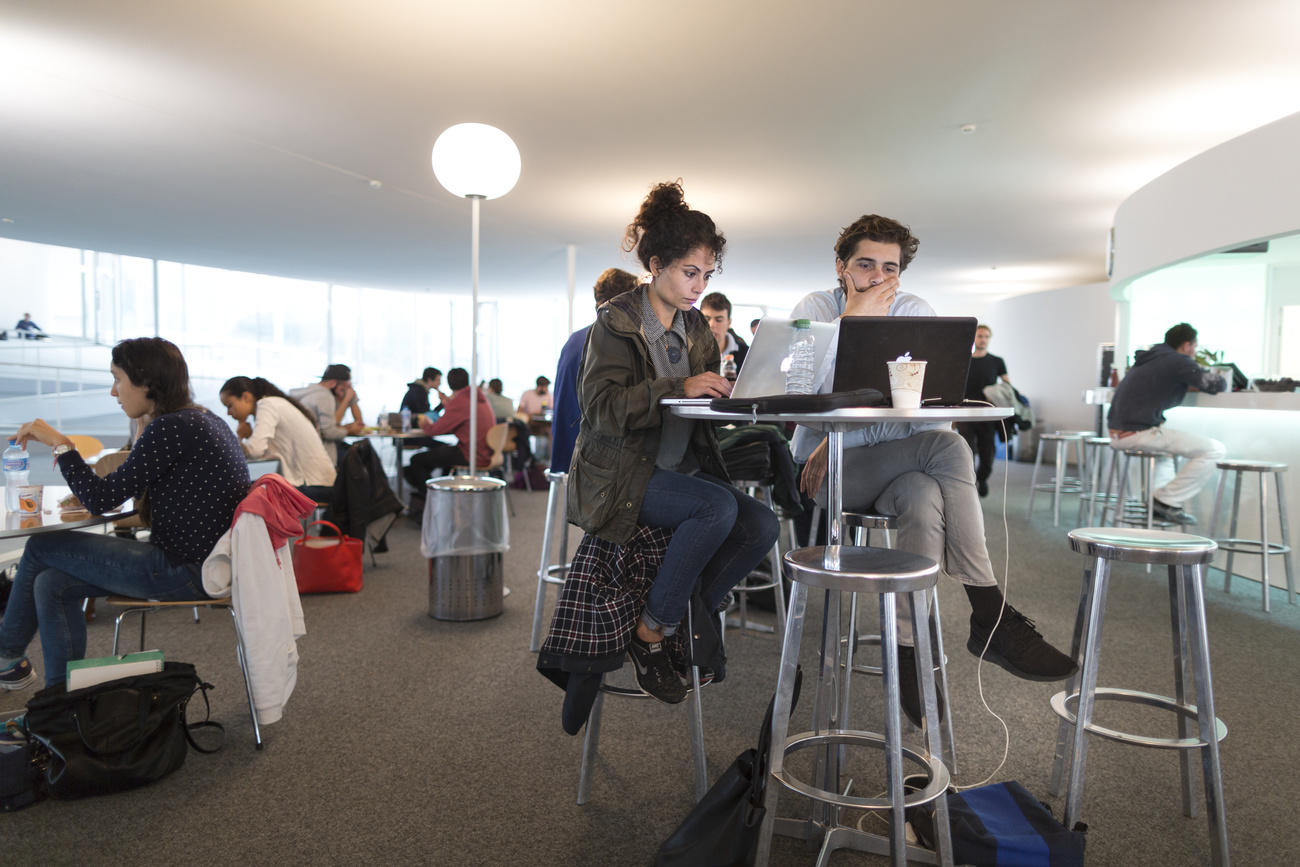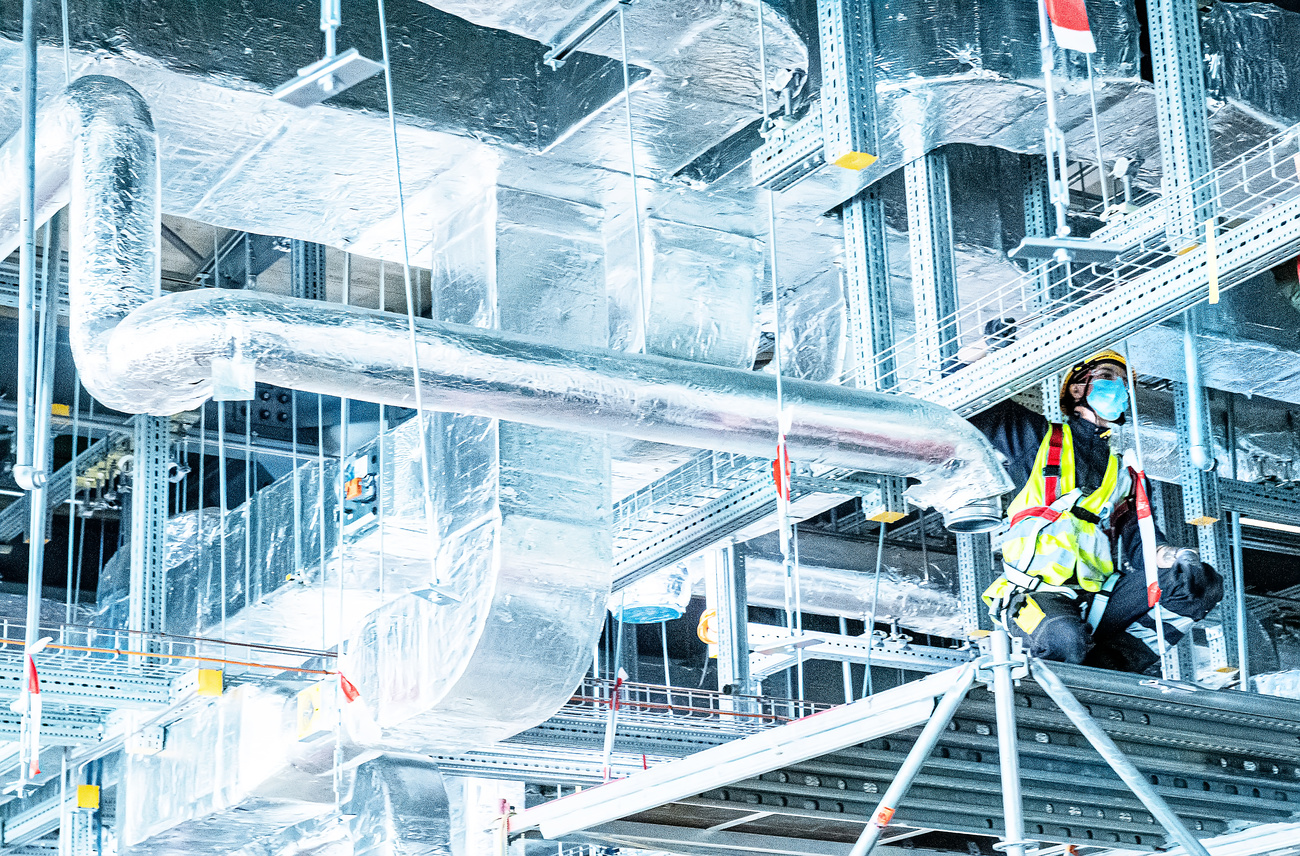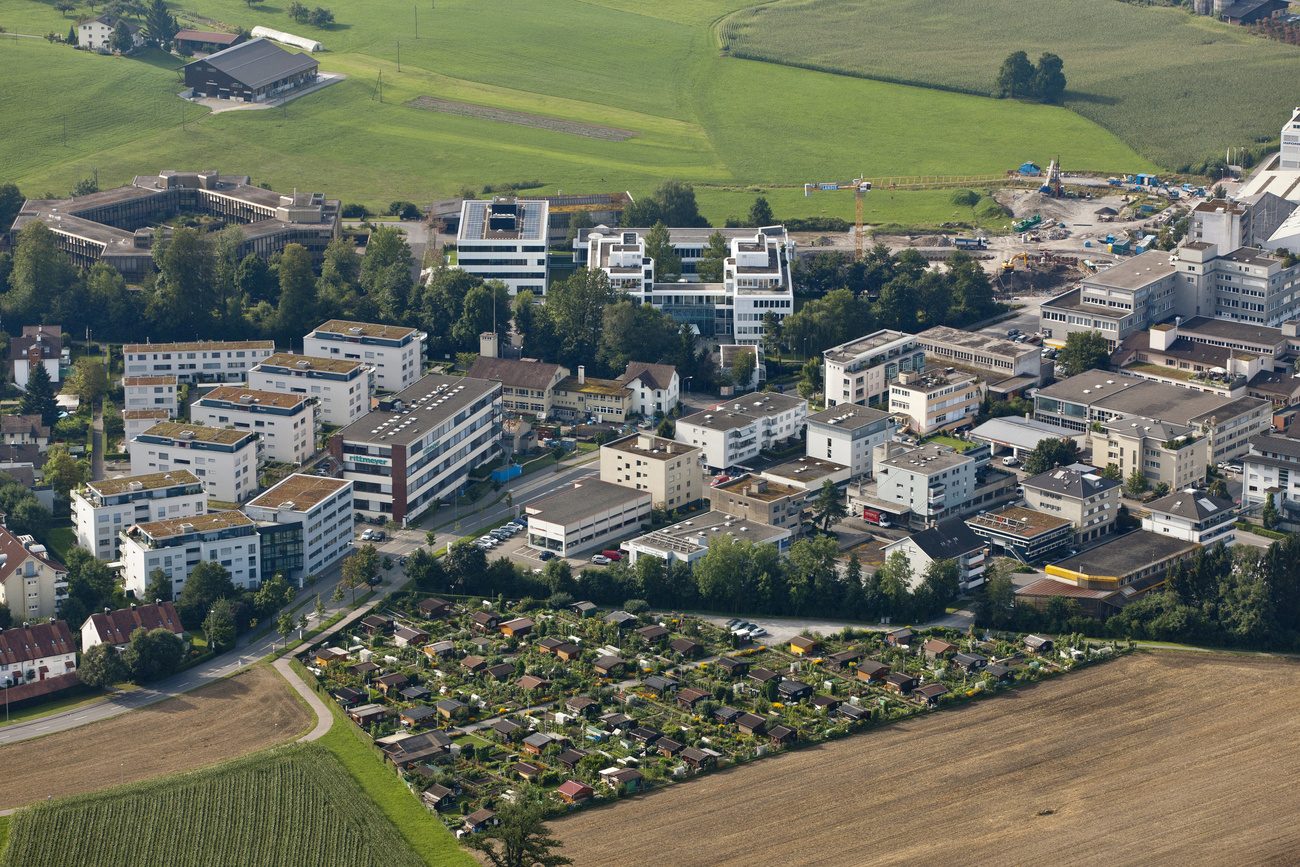Pandemic reveals Switzerland’s weak spot in securing foreign talent

Switzerland is one of the most attractive places to work, making it a competitive place for job seekers from abroad. But the country is increasingly being challenged as a business location because of immigration restrictions. Could the pandemic be a turning point?
In April, Swiss biotech firm Lonza came under pressure over delays at its brand-new manufacturing facility producing ingredients for Moderna’s Covid-19 vaccine. These were in part due to difficulties recruiting workers such as bioprocess engineers and quality controllers in the southern canton of Valais. The company plans to fill 1,200 new roles in Visp – a town of about 8,000 people.
Some Swiss media suggested that the cap on foreign workers – which in Valais is 42 residence (B) permits for 2021 – made recruitment more difficult. A Lonza spokesperson wouldn’t confirm this but acknowledged that finding people with the right qualifications has been challenging for many reasons.
While the rapid ramp-up of vaccine production may be unique, some politicians argue Lonza’s staffing difficulties are another sign that Switzerland needs to be more open to highly skilled people outside Europe, also known as non-EU/EFTA nationals, if it is going to stay competitive as a place to do business. This comes at a time when Swiss companies access to talent in Europe is in question after the government rejected a framework deal with the bloc.
“The crisis and the Lonza affair have shown politicians how serious the problem really is when it comes to talent,” former parliamentarian Fathi Derder told SWI swissinfo.ch. Proposals to ease restrictions for skilled foreigners that have been debated for years appear to be gaining more support in the wake of the pandemic.
On May 4 the Swiss House of Representatives accepted a motion put forward by Derder two years ago calling for the current quota system to be replaced with a more flexible immigration system.
More
Reaching the quota
Based on the Free Movement of People’s Agreement with the EU that came into force in 2002, there are no quotas for workers from EU countries and the European Free Trade Area (EFTA). The situation is different for nationals from so-called third countries such as the United States, India, and China. After Brexit, separate quotas were set for UK nationals.
Quotas for short-term (L permits) and residence (B permits) permits for these countries (aside from the UK) have been in the range of 6,500 to 8,500 per year. These are set based on consultations with cantons and economic and political developments in the country, according to the Swiss migration office (SEM). A portion is distributed to cantons based on expected needs, and some are left in a federal reserve.
Julia Stutzer, immigration director for global employer services at the consulting firm Deloitte in Zurich, told SWI swissinfo.ch that the overall quota number hasn’t been the main issue after the quotas were raised in 2017. Her team of 20 applies for around 4,000 permits a year in Switzerland on behalf of clients, that include many multinational companies. After Deloitte vets the applications, not many get rejected.
However, Alexa Mossaz, an immigration law specialist with legal services firm Legal Expat Switzerland, said that the number of “non-EU B permits available is not high enough for cantons such as Geneva, Vaud or Zurich where there is large demand” due to the presence of foreign multinationals. Stutzer backs this up saying that these cantons usually reach theor quota mid-year and call on the federal reserve.
Worth the hassle?
Companies are reluctant to speak out too strongly against the current system and upset relations with cantons according to sources, especially given political sensitivities on immigration issues. Swiss voters narrowly approved a plan to curb mass immigration in 2014, that led to the reintroduction of quotas.
Roche CEO Severin Schwan made wavesExternal link in 2016 when he questioned why the Swiss government reduced quotas for third-country nationals, stating that half of the employees in Roche’s research department come from abroad. Behind closed doors, managers at multinationals can be found grumbling about how difficult it is to hire people from non-EU/EFTA countries.
A study by Deloitte and the Swiss-American Chamber of Commerce published last year found that Switzerland is losing ground to other countries as an attractive place for multinationals to set up shop due to the complexity of hiring young, foreign talent.
Nevertheless, large companies that are major revenue generators for cantons are still in a better position to secure permits. A Novartis spokesperson told SWI swissinfo.ch in May that it receives “sufficient permits” to meet its “confirmed immigration needs”.
However, experts say that many companies don’t want to take their chances applying unless they are confident the candidate will receive a permit and risk losing out on other talent in the meantime.
Third-country nationals are supposed to be hired only when “absolutely needed” according to the Swiss government. Companies must follow strict procedures to show that no one in Switzerland and Europe can fill the role.
“It’s quite a lengthy process to request a permit for someone from outside the EU and it has a price,” said Nicolai Mikkelsen, who is the Executive Director at the Zurich arm of human resource firm Michael Page.
“When we work with headhunters, they prefer not to see profiles from outside the EU because they will struggle to get them through.” Mikkelsen added that some companies are even wary of starting an internal transfer process because they fear it won’t go through.
Battle for talent
Stutzer from Deloitte noted that the permit requirements are geared towards more senior, experienced workers but many companies are more focused on essential skills that are hard to find locally. Such candidates don’t have the standard tick-box career path. For example, pharma companies are in a battle for fresh, young talent that have specialised skills such as “real world” patient data analysis and Artificial Intelligence.
A study by Spring Professional found that, although unemployment rose in some professions in Switzerland, the pandemic had little impact on shortages in areas like engineering, computer science and medicine. It actually “accentuated skill shortages in highly specialized professions” like medical technology.
Paradoxically, some of the people that Switzerland is most interested to attract face the hardest time securing permits such as recent graduates from Swiss universities and entrepreneurs in fields like engineering, biotechnology, and computer science.
“Even in areas like IT / software development, where we have a ‘war for talents’, permit processes can be rejected,” said Franziska Schmid from the Federal Institute of Technology ETH Zurich.
Eric Burns, an American who just finished his PhD in chemistry at ETH and the Paul Scherrer Institut, has struggled to find an employer willing to “sponsor” him for a permit. He’s had job offers from big companies and co-founded a start-up working on renewable energy technology. After graduation, his B permit tied to his studies expired, and he managed to secure a short-term L permit. If he doesn’t receive a residence permit in the next few months, he’ll have to leave the country, likely taking his start-up plans elsewhere.
Burns, who has lived in Switzerland for more than 4 years, is willing to consider jobs that aren’t exactly tied to his field of study but didn’t expect the process to be so complicated. “It is the uncertainty that makes it so difficult to plan my life,” he told SWI swissinfo.ch. If he knew how difficult it would be to stay here, Burns said that he’s not sure he would have come to Switzerland to study.

More
Non-EU graduates struggle with Swiss job access
Non-EU skilled graduates often find themselves in a predicament said immigration specialist Mossaz. They are supposed to have six months to look for a job after their studies and be hired under the same conditions as a Swiss or EU graduate. But they have to show sufficient financial means to obtain this short-term authorisation, which is difficult without a job and the lack of access to unemployment benefits allowed on their visa.
Movers and shakers
The situation is particularly challenging for smaller companies like biotechs or software start-ups. Michael Altorfer who heads the Swiss Biotech Association told SWI swissinfo.ch that everyone is competing for a very small pool of people who know how to secure external funding, manage an R&D pipeline and liquidity reserves, and have knowledge of clinical development.
He thinks that Switzerland should explore the idea of an entrepreneurial or start-up visa. Something like this is already available in countries like the US, France, Canada and Israel.
Mossaz explained that start-ups wishing to hire a non-EU expert have to demonstrate their economic importance to the canton. “A small start-up not generating any revenues is likely to fail in the process. The start-up must generate revenues and show strong potential over the next 3 years for the Swiss economy in order to meet the permit criteria,” said Mossaz.

More
Lonza to double production of Covid-19 vaccine at Swiss plant
Finding the right balance
The problems in vaccine production has brought the access to talent concerns to the highest ranks of government. On May 19, Interior Minister Alain Berset said that the government has helped recruit 75 people to fill staffing gaps at Lonza. Even more workers will be needed in Lonza’s Visp site as Moderna plans to double Swiss production capacity for the Covid-19 vaccine in the next year. Lonza has also announced expansion in other production areas.
What the solution is long-term is less clear. Derder believes quotas should be eliminated but some groups worry this would lead to wage dumping, population pressure and greater competition for jobs.
In a paper published last year, Deloitte and the Swiss-American Chamber of Commerce suggest more moderate changes such as “innovation permits” for foreign students in technical fields. They also propose a certification system for “trusted companies” to help talent within a company move more easily – something the Netherlands has already put in place.
The Swiss system is reliable and works in many ways, said Stutzer from Deloitte. “We don’t think the whole immigration system needs to change. But it needs more digitalization and flexibility on quotas and processes for this small group of people that bring much needed know-how to Switzerland.”
Derder sees the vote on May 4 as a step forward but the motion still needs to pass the Senate to be accepted. Last March, the government also agreed to prepare a report looking at some of the options for changing the immigration rules. Other proposals have also gained more support over the last couple years. It’s also unclear how Switzerland’s recent rejection of a deal with the EU will affect views on immigration.
“We need to fight to be at the top. We can’t say we will always be rich,” Derder told SWI swissinfo.ch. “We should have a red carpet for talent from abroad. We should say, don’t go to Israel or Silicon Valley, come to Switzerland.”
Correction: The original version of this story incorrectly stated that Eric Burns had done a post-doc.

More
Switzerland losing attractiveness for multinationals

In compliance with the JTI standards
More: SWI swissinfo.ch certified by the Journalism Trust Initiative
















You can find an overview of ongoing debates with our journalists here . Please join us!
If you want to start a conversation about a topic raised in this article or want to report factual errors, email us at english@swissinfo.ch.